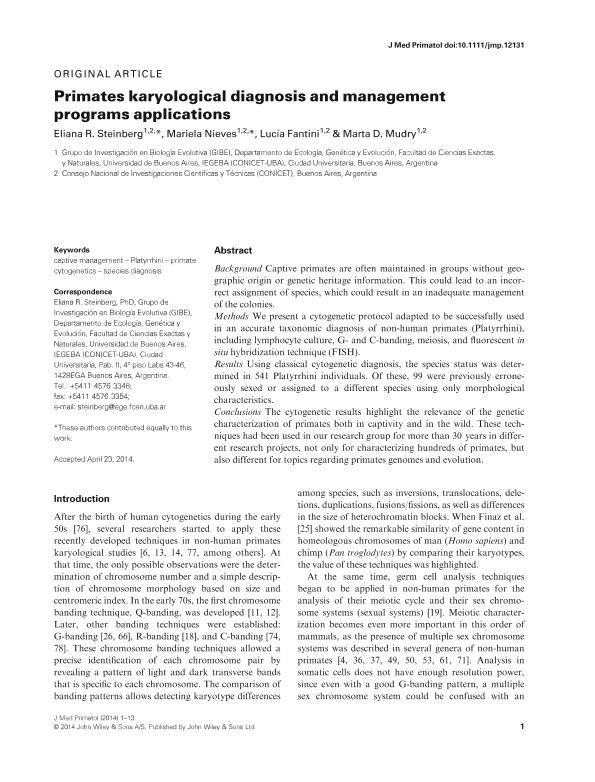Artículo
Primates karyological diagnosis and management programs applications
Fecha de publicación:
12/2014
Editorial:
Wiley
Revista:
Journal Of Medical Primatology
ISSN:
0047-2565
Idioma:
Inglés
Tipo de recurso:
Artículo publicado
Clasificación temática:
Resumen
Background: Captive primates are often maintained in groups without geographic origin or genetic heritage information. This could lead to an incorrect assignment of species, which could result in an inadequate management of the colonies. Methods: We present a cytogenetic protocol adapted to be successfully used in an accurate taxonomic diagnosis of non-human primates (Platyrrhini), including lymphocyte culture, G- and C-banding, meiosis, and fluorescent in situ hybridization technique (FISH). Results: Using classical cytogenetic diagnosis, the species status was determined in 541 Platyrrhini individuals. Of these, 99 were previously erroneously sexed or assigned to a different species using only morphological characteristics. Conclusions: The cytogenetic results highlight the relevance of the genetic characterization of primates both in captivity and in the wild. These techniques had been used in our research group for more than 30 years in different research projects, not only for characterizing hundreds of primates, but also different for topics regarding primates genomes and evolution.
Palabras clave:
Platyrrhini
,
Primate Cytogenetics
,
Species Diagnosis
,
Captive Management
Archivos asociados
Licencia
Identificadores
Colecciones
Articulos(IEGEBA)
Articulos de INSTITUTO DE ECOLOGIA, GENETICA Y EVOLUCION DE BS. AS
Articulos de INSTITUTO DE ECOLOGIA, GENETICA Y EVOLUCION DE BS. AS
Citación
Steinberg, Eliana Ruth; Nieves, Mariela; Fantini, Lucía; Mudry, Marta Dolores; Primates karyological diagnosis and management programs applications; Wiley; Journal Of Medical Primatology; 43; 6; 12-2014; 455-467
Compartir
Altmétricas




